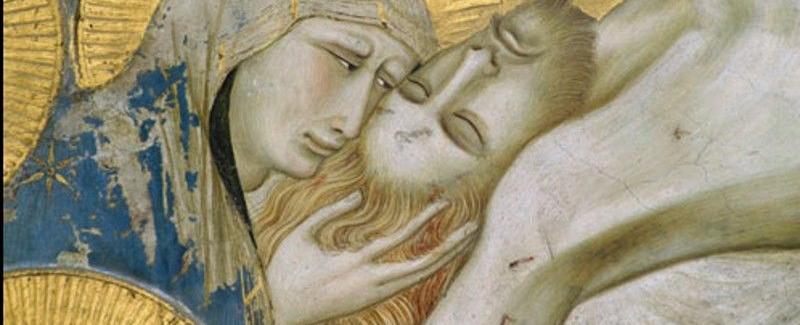Feast of Our Lady of Sorrows: The Franciscan Connection

As the Church celebrates the Feast of Our Lady of Sorrows (September 15), it is good to know the important role that Franciscans played in promoting this particular image of Mary and why.
Cross of Christ central to Saints Francis and Clare
The Cross of Christ was central to Francis and Clare, as we know from the place the cross of San Damiano played in their lives and from Francis’s early prayer, “We adore you, Lord Jesus Christ, in all your churches throughout the whole world and we bless you, because by your holy cross you have redeemed the world.”

Crucifixion fresco by Pietro Lorenzetti (c. 1315-1320) in the Basilica of Saint Francis in Assisi
Promoting the suffering humanity of Jesus
But by the 1220s this emphasis took a new turn: in their preaching of penance, Franciscans promoted devotion to the suffering humanity of Jesus in order to lead people to conversion. It was important for Franciscans that people not simply should understand with their minds that Christ died on the cross for their sins, but that they convert their lives as a result. Therefore, Franciscan preachers wanted to touch peoples’ affections so that their hearts might be transformed and they would be motivated to abandon sin and choose the good.
Human mother’s compelling emotional effect
However, “no matter how much the humanity of Christ was emphasized, it was still difficult for the contrite spirit to relate its own human responses of love or suffering to the figure on the cross while conscious of Christ’s divinity. Some referent for computing the nature of God’s love for humanity was required . . . [and so drawing attention to] the love and compassion of a human mother for her suffering child would naturally have a compelling emotional effect in actuating the conversion of the affections and move the heart to repentance. . . “ (David Jeffrey, The Early English Lyric & Franciscan Spirituality).

Taking down the body of Jesus from the cross (fresco by Pietro Lorenzetti in Basilica of Saint Francis in Assisi)
Suffering figure of Mary moves people to repentance
So, from the time of Saint Anthony on, Franciscan preachers often focused on the suffering figure of Mary, standing in agony under the cross, to move Christians to repentance. This emphasis was certainly not unique to the Franciscans—a new penitential brotherhood, the Servants of Mary (Servites) in fact sprang up in Tuscany in the 1230s—but Franciscans were among the chief propagators of this trend.

Detail from fresco by Pietro Lorenzetti in Basilica of Saint Francis in Assisi that depicts the Crucifixion. Here the Blessed Mother is collapsed in grief at the foot of the Cross supported by one of the Marys and St John.
Liturgical Sequence “Stabat Mater”
The famous sequence "Stabat Mater," used in the Church’s liturgy on this feast, is often attributed to the Franciscan Jacopone of Todi, but even before this, Saint Bonaventure wrote:
What tongue can tell,
what intellect grasp
the heavy weight of your desolation,
Blessed Virgin?
You were present at all these events,
standing close by and participating in them
in every way.
This blessed and holy flesh –
which you so chastely conceived,
so sweetly nourished
and fed with your milk,
which you so often held on your lap,
and kissed with your lips –
You actually gazed upon
with your bodily eyes
Now torn by the blows of the scourges,
Now pierced by the points of the thorns. . .
Now pierced by nails and fixed to the wood of the cross. . ."Jesus, my Son, Jesus permit me to die with you and for you, my son, oh sweetest Jesus!"
Oh my God, good Jesus, my God crucified and put to death for me,
Grant me that feeling of compassion
which your innocent mother experienced
at the very hour of your passion.(Tree of Life, 28, 32; Mystical Vine, 9).
Main image: Taking down the body of Jesus from the cross (detail of fresco by Pietro Lorenzetti in Basilica of Saint Francis in Assisi)
Dominic Monti, OFM
Professor of Franciscan Research in the Franciscan Institute of St. Bonaventure University
Dominic V. Monti, OFM, is a Franciscan Friar of Holy Name Province (USA) and currently professor of Franciscan Research in the Franciscan Institute of St. Bonaventure University. He devoted the greater part of his ministry to teaching the History of Christianity, in particular the history of the Franciscan movement. He has contributed two volumes to the Works of St. Bonaventure series and is author of Francis & His Brothers, a popular history of the Friars Minor.

